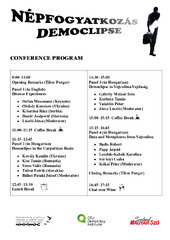Приказ основних података о документу
Bridging Minority and Diaspora: Virtual Kinship in the Vojvodina Hungarian Community
| dc.creator | Racz, Krisztina | |
| dc.date.accessioned | 2024-01-09T12:56:37Z | |
| dc.date.available | 2024-01-09T12:56:37Z | |
| dc.date.issued | 2023 | |
| dc.identifier.uri | http://rifdt.instifdt.bg.ac.rs/123456789/3701 | |
| dc.description.abstract | The presentation aims to account for the social dynamics that have taken place in the Hungarian community in Serbia since 2010 and that have not yet been parts of academic debates. Namely, for Vojvodina Hungarians, the economic hardships and the unfavorable political climate that most citizens of Serbia have felt have been alleviated by the possibility to obtain Hungarian citizenship. As a result of this, the province has seen a new wave of mass emigration of the members of this ethnic group, that has been reflected in the data from the latest census of 2021, but also novel ways of “in-betweenness” of residencies and identifications. Academically, the Vojvodina Hungarian community has been tackled mainly within the field of minority studies, which has yielded important findings but fails to explain current changes in community members’ identification. On the other hand, diaspora studies has traditionally focused on emigrees that have moved that have changed countries “for good” and has been slow to incorporate phenomena such as commuting, temporary residency, parallel cultural ties with two societies, as well as issues of minority identity, language, and culture. I examine the common themes in the two Facebook pages popular among Hungarians from Serbia, Rokon Ilonka Copyright and University of Bótelőtt. I argue that the forms and contents in these online platforms not only represent and revoke but also construct a new form of Vojvodina Hungarian identity, in which community membership does not rest on being in, but on being from Vojvodina, and is grounded in sharing a certain humor, knowledge, language, and experiences. I contend that to understand the complex dynamics of identification of ethnic minority communities with excessive cross-border characteristic such as Vojvodina Hungarians, an approach that merges the lens of ethnic minority and diaspora studies is needed. | sr |
| dc.language.iso | en | sr |
| dc.relation | "info:eu-repo/grantAgreement/MESTD/inst-2020/200025/RS//" | sr |
| dc.rights | openAccess | sr |
| dc.rights.uri | https://creativecommons.org/licenses/by/4.0/ | |
| dc.source | Democlipse conference | sr |
| dc.subject | minority | sr |
| dc.subject | diaspora | sr |
| dc.subject | humor | sr |
| dc.subject | memes | sr |
| dc.subject | identity | sr |
| dc.title | Bridging Minority and Diaspora: Virtual Kinship in the Vojvodina Hungarian Community | sr |
| dc.type | conferenceObject | sr |
| dc.rights.license | BY | sr |
| dc.description.other | Konferencija je održana 24.11.2023. na CEU u Budimpesti. Organizatori su Fondacija za slobodu štampe, CEU Democracy Institute i Szabad Magyar Szó. | sr |
| dc.type.version | publishedVersion | sr |
| dc.identifier.fulltext | http://rifdt.instifdt.bg.ac.rs/bitstream/id/13379/bitstream_13379.pdf | |
| dc.identifier.rcub | https://hdl.handle.net/21.15107/rcub_rifdt_3701 |

